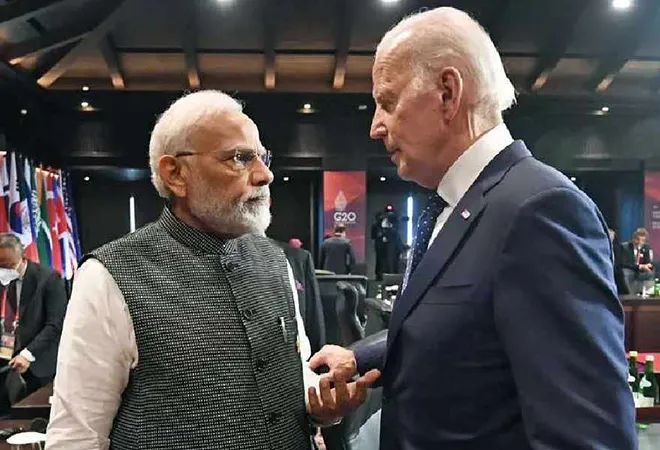
When India assumed the SCO presidency in September 2022 and the G20 presidency in December 2022, both came with their own sets of promises and expectations. While the SCO was slated to test India’s commitments to championing the cause of the Global South, the G20 presidency became synonymous with New Delhi’s global leadership. Most importantly, these leadership roles for India came at a time of unprecedented global flux, most conspicuously asterisked by the unabating Russia-Ukraine conflict. Navigating regional and global challenges with one of the largest continental wars since WWII in the backdrop imparted a great degree of uncertainty to any potential outcomes.
India’s stance on the Russia-Ukraine conflict became a global barometer for testing the resilience of the India-US relationship.
Perhaps, a more exacting component for India’s leadership was to drive home a consensus as the leader of the G20, even as the fractures that ensued as a result of the Russia-Ukraine conflict remained divisive and irreconcilable, and has tested India’s balancing abilities. Yet, with a year in hindsight, there couldn’t have been a better choice of leadership for both the SCO and the G20, given the fractious global order and India’s well-honed diplomatic proficiencies through its erstwhile non-aligned stance as well as its strategic autonomy.
The China challenge
When India’s G20 presidency began in December 2020, it was cushioned by an upward trajectory of its relationship with the United States (US). The US Secretary of State, Antony Blinken,
promised that the US will do everything to make India’s G20 presidency a success. Yet, India’s stance on the Russia-Ukraine conflict became a global barometer for testing the resilience of the India-US relationship. For India, the challenge was two-fold: First, to convince its Western partners, led by the US, of its geopolitical compulsions, economic necessities, and independent decision-making in the context of the Russia-Ukraine war. Second, to navigate its multifaceted China challenge, which remains the single most outstanding obstruction to India’s global leadership. China has consistently opposed India’s stand in the United Nations (UN), be it on the UN terror listing of prominent and identifiable terrorists or India’s inclusion in the United Nations Security Council (UNSC) itself. A growing bilateral relationship between India and the US not only in the defence sector but also in the broader spectrum of their strategic partnership in the Indo-Pacific was expected to play into China’s calculations as well. Furthermore, China’s global alignment with an axis opposed to that of the US became more acute with the US supporting Ukraine against Russia. For India, although it narrowed the path to hedging, India-US relations were not impacted in any way. On the contrary, India’s consistent position on the issues of difference, most prominently on the Russia-Ukraine conflict, led to a gradual accommodation of its stand by the West.
China has consistently opposed India’s stand in the United Nations (UN), be it on the UN terror listing of prominent and identifiable terrorists or India’s inclusion in the United Nations Security Council (UNSC) itself.
India-US relations
Several high-level visits between India and the US during the last year have depicted that the bilateral relationship has only grown. Starting with one of the initial meetings of the foreign ministers of the G20 held in March 2023, the US and India have collaborated closely to achieve the twin objectives of ensuring a successful leadership for India and achieving productive collaboration in the
areas of food, health, economy, energy, climate, women’s security, countering terrorism, and counternarcotics. During US Treasury Secretary Janet Yellen’s visit to Gujarat to attend the G20 meeting in July this year, she called India and US the “
closest partners globally”. In the area of energy security, India is
working with the US to fast-track the energy transition by creating an investment platform aimed at reducing capital expenses and boosting private investments.
Prime Minister Modi’s
visit to the US in June proved critical in leapfrogging the bilateral relationship with the US. The past one year has proven productive in taking the relationship to the next level. The signing of the
initiative on Critical and Emerging Technology (iCET) between the two countries in January this year—to boost collaborative innovation ecosystems as well as a defence roadmap finalised during PM Modi’s visit—augur well for the promises of a bilateral relationship.
Although India’s relationship with both the US and China are likely to continue in its current form, at least for the short term, a robust bilateral relationship with the US could impart assurance to India in dealing with regional and global impediments, keeping India’s interests front and centre.
The Biden administration has depicted great faith in India’s leadership of the G20. Such convictions are grounded in India’s democratic character, stable and rapid economic growth, its huge market potential, demographic dividend, a solid anchor in the Indo-Pacific region, and a strategic partner in this region to balance and manage China. These convergences have ensured that India and the US can collaborate, cooperate, and also differ on issues global governance without any hostility. Both India and the US view today’s multilateralism to be in crisis. On the part of the US, this has come to be associated with working with like-minded partners like India, while for India it has meant working towards a ‘
reformed multilateralism’ where the Global South has more say and representation in global institutions and on world platforms.
Almost the entirety of India’s G20 presidency was silhouetted by a dormant but unresolved conflict with China. On the contrary, India’s relationship with the US touched new heights during the same period. Although India’s relationship with both the US and China are likely to continue in its current form, at least for the short term, a robust bilateral relationship with the US could impart assurance to India in dealing with regional and global impediments, keeping India’s interests front and centre.
Vivek Mishra is a Fellow with the Strategic Studies Programme at the Observer Research Foundation.
The views expressed above belong to the author(s). ORF research and analyses now available on Telegram! Click here to access our curated content — blogs, longforms and interviews.



 When India assumed the SCO presidency in September 2022 and the G20 presidency in December 2022, both came with their own sets of promises and expectations. While the SCO was slated to test India’s commitments to championing the cause of the Global South, the G20 presidency became synonymous with New Delhi’s global leadership. Most importantly, these leadership roles for India came at a time of unprecedented global flux, most conspicuously asterisked by the unabating Russia-Ukraine conflict. Navigating regional and global challenges with one of the largest continental wars since WWII in the backdrop imparted a great degree of uncertainty to any potential outcomes.
When India assumed the SCO presidency in September 2022 and the G20 presidency in December 2022, both came with their own sets of promises and expectations. While the SCO was slated to test India’s commitments to championing the cause of the Global South, the G20 presidency became synonymous with New Delhi’s global leadership. Most importantly, these leadership roles for India came at a time of unprecedented global flux, most conspicuously asterisked by the unabating Russia-Ukraine conflict. Navigating regional and global challenges with one of the largest continental wars since WWII in the backdrop imparted a great degree of uncertainty to any potential outcomes.
 PREV
PREV


